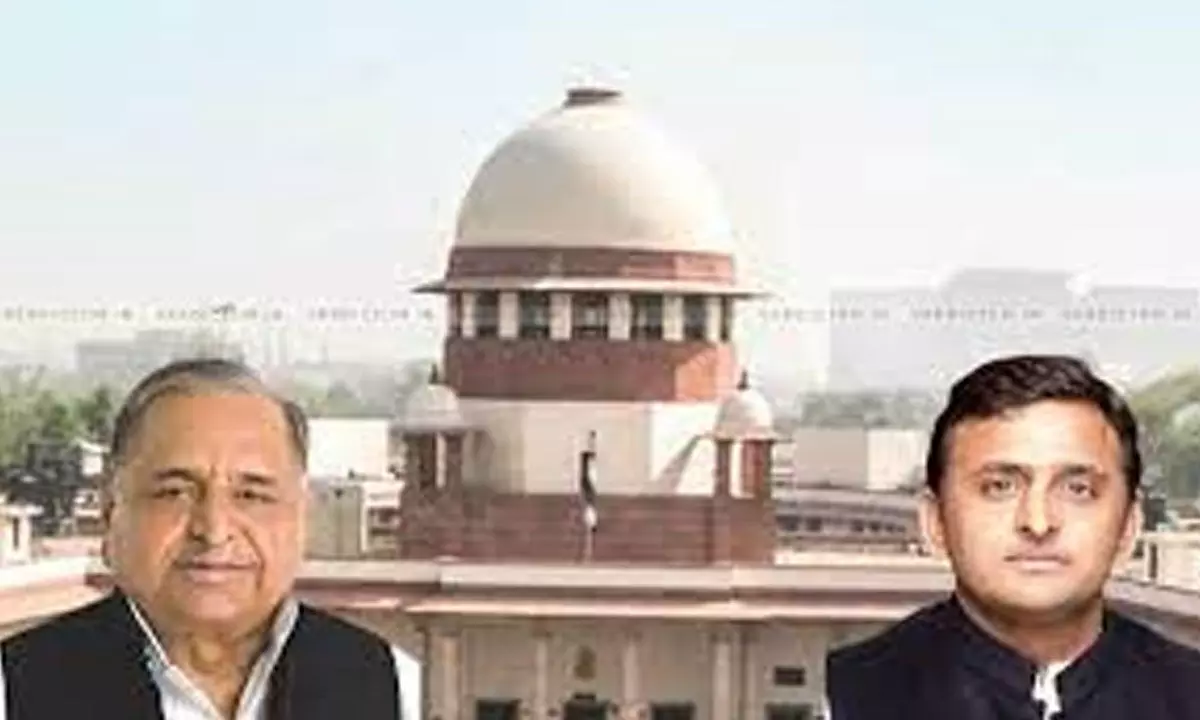Supreme Court dismisses plea for copy of CBI report


Supreme Court dismisses plea for copy of CBI report
The Supreme Court on Monday dismissed a plea seeking a copy of the CBI report on closure of its preliminary enquiry into allegations of amassing disproportionate assets against former Uttar Pradesh Chief Ministers Mulayam Singh Yadav and his son Akhilesh Yadav.
New Delhi: The Supreme Court on Monday dismissed a plea seeking a copy of the CBI report on closure of its preliminary enquiry into allegations of amassing disproportionate assets against former Uttar Pradesh Chief Ministers Mulayam Singh Yadav and his son Akhilesh Yadav. The CBI had told the apex court in 2019 that since "no prima facie evidence" of commission of a cognisable offence was found against Mulayam and his two sons- Akhilesh and Prateek- the Preliminary Enquiry (PE) was not converted into a criminal case/FIR, and as such, no enquiry was conducted in the matter after August 7, 2013. A bench of Chief Justice DY Chandrachud and Justices PS Narasimha and JB Pardiwala said, "Since the judgements dated March 1, 2007 and December 13, 2012, the CBI has closed its preliminary enquiry on August 7, 2013 and submitted its report on October 8, 2013 to the CVC. This application has been filed in 2019 after six years.
There is no merit in the application and hence it is dismissed." The top court pointed out that former Uttar Pradesh chief minister Mulayam Singh Yadav had passed away and asked petitioner Vishwanath Chaturvedi as to what remains in the case. Counsel for the petitioner said the proceedings against Mulayam have been dropped but allegations are also against his sons-Akhilesh and Prateek. Senior advocate Kapil Sibal, appearing for Akhilesh and Prateek, said the CBI filed the closure report after conducting the preliminary enquiry and said no case is made out for registration of a regular case.
Counsel for Chaturvedi contended he had filed an RTI application before the Central Vigilance Commission (CVC) and he was informed that no such closure report was filed by the CBI. Justice Narasimha said the closure report was filed in 2013 and the petitioner filed his plea in 2019.
"Tell us how we can entertain this application after so many years", Justice Narasimha asked. The counsel said when a cognisable offence is prima facie made out, then the copy of the closure report has to be provided to the complainant. The bench responded, saying it is not inclined to entertain the application for a copy of the closure report and dismissed it. Mulayam Singh Yadav, 82, the founder of the Samajwadi Party, died on October 10, last year at a hospital in Gurugram after prolonged illness.
On December 5 last year, the top court had said it will hear the submissions on whether the petitioner can be given a copy of the CBI report on closure of its preliminary enquiry into allegations against Mulayam and his sons of amassing assets disproportionate to their known sources of income. Earlier, the CBI had told the court in an affidavit that after conducting further enquiry in a "fair, impartial and professional manner", it had independently taken a decision to close the probe against them in accordance with the court's 2012 directions. In its 21-page affidavit, the CBI had said, "Thereafter in compliance of the directions of the court in the judgement dated December 13, 2012, further enquiry was conducted in the said PE and it was found that the allegations against Respondent(s)..., for allegedly having acquired disproportionate assets to their known source of income could not be substantiated".
The affidavit said since no prima facie evidence of commission of cognisable offence against the suspects was found during enquiry, the PE in the present case was not converted into a criminal case/FIR, and as such, no enquiry was conducted in the matter after August 7, 2013. It noted the apex court had in its 2012 verdict passed various directions in the matter and allowed the CBI to take such independent action, as it considers fit, on the basis of the enquiry conducted by it, without seeking any direction from any corner.

© 2025 Hyderabad Media House Limited/The Hans India. All rights reserved. Powered by hocalwire.com






